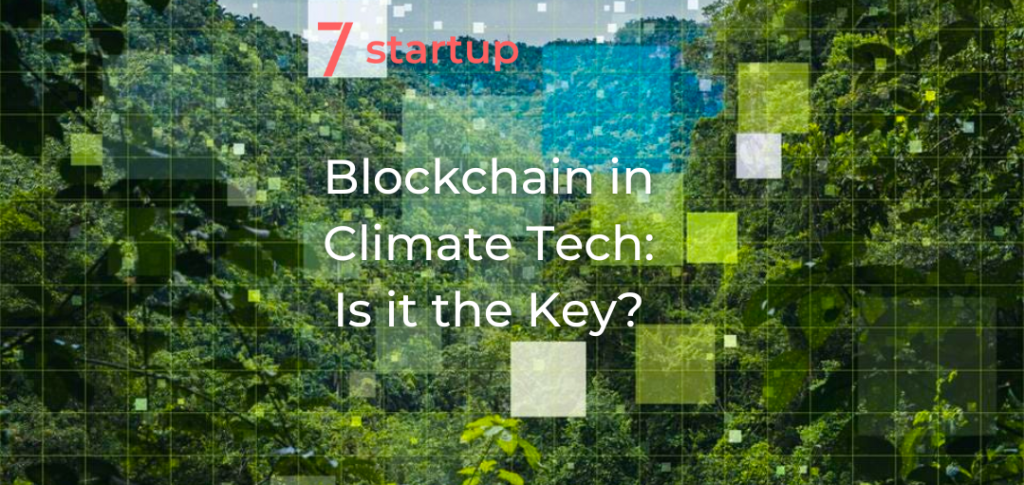Before getting to blockchain in climate tech, and how it can be utilised and even key in solving issues, we must first talk about climate tech. Addressing climate change has become one of the top priorities in today’s society, and investments in the industry reflect this. 2020 set records for the most investment in the climate tech industry to date. Just the very next year though, this record was broken with $37 billion being invested in climate tech. As many experts see this year as an anomaly, it’s no surprise this year is down 19% from 2021. However it is still booming! 2022 is currently on pace to surpass 2020 for 2nd hottest year in the industry in terms of investment. Additionally, 6 out of the top 10 global venture capital deals in Q3 2022 were climate tech.
While interest in the area is near an all-time high, this is because, in many ways, it needs to be. Investors and startup founders are realising how necessary it is to combat climate change, and that we must come up with new ideas to do so effectively. One industry that has become instrumental in this fight is blockchain. Despite getting a bad name for emissions in its mining process, blockchain technology has unique benefits for enhancing climate governance.

Blockchain in Climate Tech
Blockchain provides an open ledger that efficiently tracks contributions to environmental causes. Governments and oversight organisations may easily use blockchain to make sure funds are properly authorised to support climate technology projects. Blockchain can help to address the problem of inefficiency and lack of accountability in governments. With the exception of a serious hack, its immutability makes it extremely impossible to alter. Additionally, blockchain is renowned for being difficult to hack.
While likely over 90% of blockchain companies aren’t doing anything too meaningful, the technology involved could make clean energy investments more efficient if leveraged by the energy industry. The power industry may more effectively digitise and value investments in sustainable energy by utilising blockchains. In the private sector, blockchain in climate tech is already being put to the test.
The renownedly eco-friendly Polkadot network is being used by climate investment platform Bitgreen to create its layer-1 infrastructure after raising $5 million through Reg CF crowdfunding on Republic. By enabling climate-action programmes to benefit from blockchain, the goal is to close the sustainability gap. Even the Ethereum blockchain, known for its emissions, is upgrading to a proof-of-stake architecture, which will cut its emissions by 99 percent, for those who are still worried about the reputation of blockchain in general. The whole industry is headed in this way, with the exception of the singularly stiff Bitcoin.
More Companies Utilising Blockchain in Climate Tech
Beyond the two already mentioned, there are many companies using their blockchain technology to tackle climate change. These four companies are pushing blockchain technology based solutions and making a real impact in terms of climate change, proving there is a place for blockchain in climate tech.
Power Ledger 
Power Ledger, based in Australia, is a terrific demonstration of blockchain’s power, and it’s especially interesting considering its potential to enable distributed energy generation. The system works as a marketplace for homeowners with solar panels on their rooftops, known as ‘prosumers’ (consumers + producers), to sell excess energy to their neighbours. Traditional energy systems were based on centralised production at generally set pricing, which was managed by major utility companies.
In contrast, a distributed generation system enabled by the Power Ledger marketplace allows prosumers to sell their electricity at the desired price to consumers willing to pay that price (rather than selling to a utility company at a lower rate) while also giving customers a lower price. Blockchain, in the case of distributed generation, is a very real solution applied to a very real problem.
Frigg.eco 
Frigg.eco, based in Switzerland, brought a bold idea to reality through cutting-edge innovation: Investing in climate change mitigation infrastructure in emerging markets can be challenging because investors perceive projects as risky, funding structures are underdeveloped, progress can be difficult to measure, returns remain uncertain, and the majority of interested investors remain those to whom these barriers are especially significant, such as small scale impact-focused investors or risk-averse institutions.
Frigg gets around most of these obstacles. The theory is simple: what if we could divide large investments into many smaller ones, making them easily accessible to all types of investors? What if investors were not locked in, but could quickly cash out their returns and trade the rights to their investment at any time? Frigg’s answer was to tokenise projects, dividing large investments into smaller ones, and then selling the tokens on the Frigg marketplace. Tokens can be purchased or redeemed in most forms of money and can be based on both equity and debt funding arrangements.
FlexiDAO 
FlexiDAO, a Spain-based company, is utilising the blockchain technology revolution to increase transparency, a crucial requirement for a successful low carbon transition. Due to the intermittent nature of renewable energy sources, when the wind isn’t blowing or the sun isn’t shining, what we believe to be “green” energy may actually be coming from fossil fuels. It can be extremely difficult to determine whether this is the case. The existing energy source tracing system relies on certificates, which do not accurately reflect the grid’s actual physical state hour by hour.
To solve this issue, FlexiDAO leverages blockchain technology. In order to determine whether allegedly “green” energy may genuinely be referred to as such, their system successfully compares facts on company consumption with those on renewable energy output. As a result, the certification is visible, detailed, and operates in real time. FlexiDAO has already teamed with international juggernauts like Microsoft and Vodafone because the innovation has been positively appreciated.
Moss Earth 
Brazilian startup Moss Earth has made the process of carbon offsetting simpler by using blockchain technology to ensure the transparency and traceability of the carbon certificates. Moss tokenised local forest regions’ economic and political rights into NFTs. Thus, by purchasing an Amazon NFT through Moss, people and organisations can preserve a portion of the forest. The MCO2 cryptocurrency, available on some of the biggest international exchanges like Coinbase, Gemini, and Uniswap, now includes carbon credits from Moss.
Further Examples of Blockchain in Climate Tech
The following are some actions the EU is taking to utilise blockchain in climate tech to help combat climate change:
- Promoting the creation and use of blockchain technologies, which are best adapted to overcoming the tragedy of the commons, in order to encourage actors to reduce their carbon footprint and think about how their activities will affect society
- Establishing initiatives for technical support and funding to help blockchain-based digital innovations promote climate change adaptation and mitigation
- Accelerating the development of blockchain-based products that create a network between suppliers and customers, going beyond the individual to encompass all social stakeholders
- Supporting sustainable finance efforts and encouraging the use of blockchain-enabled technology to finance climate action through green bonds, fintech solutions, and alternative finance mechanisms
- Supporting the creation and adaptation of blockchain-based solutions that assist climate action and the reduction of greenhouse gas emissions by EU nations and national government organisations
- Forging relationships with key stakeholders, such as UN agencies and international financial institutions like the World Bank, the European Investment Bank, and the European Bank for Reconstruction and Development
- Promoting the development of the European clean technology innovation ecosystem and enhancing small- and medium-sized businesses’ access to financing.
Conclusion
It would be irresponsible for governments to not utilise blockchain in stimulating innovation and addressing the climate governance dilemma. We should expect this to happen as governments continue to rely on technology to combat climate change as crypto regulatory frameworks proliferate around the world. If you enjoyed this and want to learn more about Climate Tech, read our review of Climate Tech in 2022.

Amit Khanna, 7startup Founder
Amit has 18 years of experience in the industry and an MBA. He supports entrepreneurs with every aspect of their business including concept and product development, investor presentations, and fundraising. Amit & 7startup assist startups in the pre due-diligence process and help connect them to our vast network of investors. Reach out to us today and see if we’re a fit!






